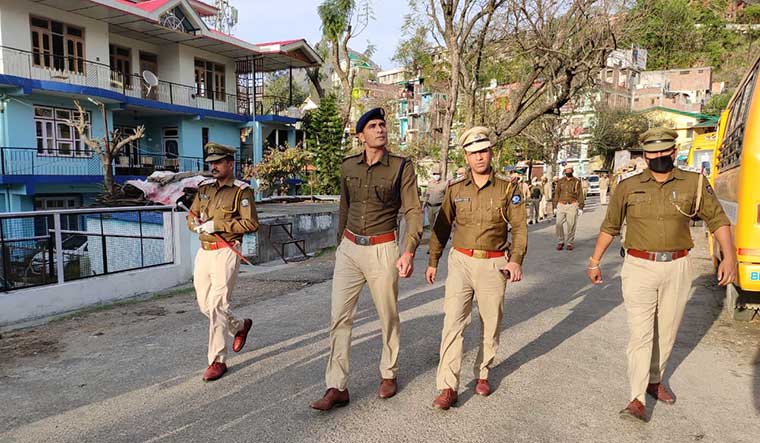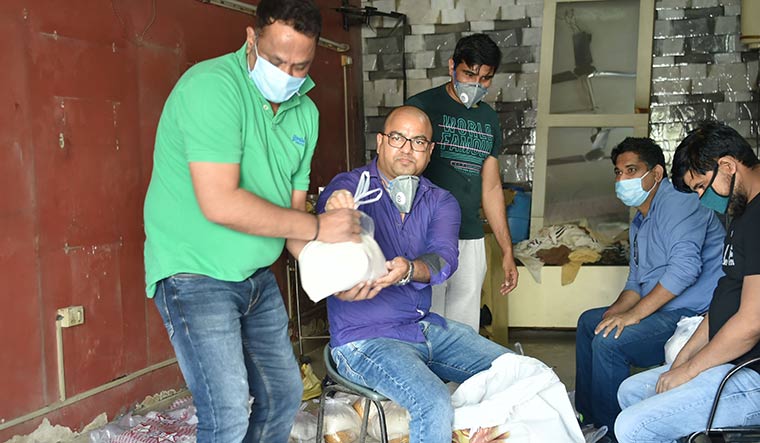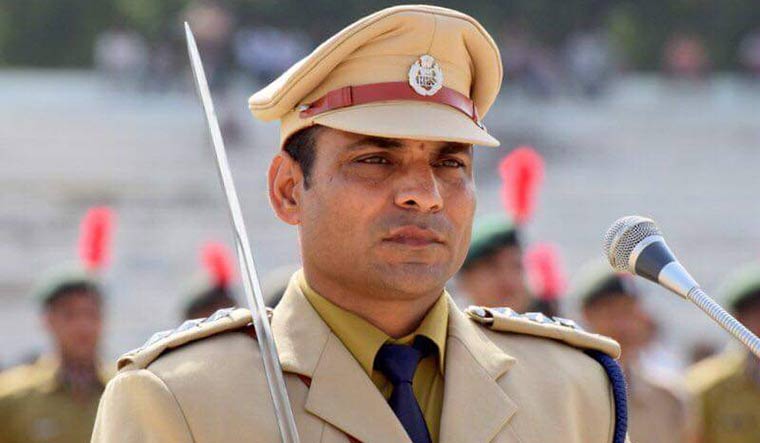On regular days, Akhil Kumar meets his staff at his Traffic Tower office in DLF phase IV, Gurugram. The assistant commissioner of police (traffic), in charge of posh east Gurugram, then assesses the situation on the 30km stretch of the Delhi-Jaipur highway that comes under him.
But these are not regular days. The boxer, who won gold at the 2006 Commonwealth Games, has his hands full. He has to ensure that people do not hit the roads unnecessarily during the nationwide lockdown.
The initial days were especially tough, and Kumar spent endless hours trying to manage the migrant workers who were walking home to their villages. “People were getting information from various verified and unverified sources,” he told THE WEEK. “It was not just the poor and the uneducated who were defying the lockdown, even the so-called educated were flouting norms.”
While he could be stern with the educated rich, Kumar found himself helpless while dealing with the poor. “You try explaining to the migrants that this is being done for their own good, but how much can you convince them?” he asked. “We had directives to not use any force with the migrating public or speak rudely to them. However, once we were told to ensure that the movement was stopped, we had to be firm. After the first few days, things smoothed out.”
With his focus on the streets, Kumar now finds barely any time to spend with his wife and daughter. Neither do his colleagues, who sometimes stay at work for 10 days at a stretch rather than take the risk of spreading infection by going home.
As a former athlete, Kumar knows how to enforce discipline. But dealing with the poor was emotionally draining, he said. Days into the lockdown, a hungry couple approached his car on the highway, asking for food. He gave them all he had, but many others showed up, hope in their eyes.
He returned home that day and called up his athlete and school friends in Gurugram. Together, they started pooling money and feeding the homeless living in shelters. “Three of us started by contributing towards 100 packets, which included 3kg of atta, dal and 1kg rice each,” said the Arjuna awardee. “The group of friends started expanding and more people contributed. We try to do our little bit.”
Gagan Ajit Singh, too, is doing his bit. The former India forward had scored many a memorable goal during his hockey days, but as deputy commissioner of police, security and operations, Amritsar, he is currently enforcing the lockdown in the city, and leading teams that distribute food and essential supplies to the old and needy. “The situation is different,” he told THE WEEK. “It is not a typical law and order situation. Chief Minister Amarinder Singh and DG (Director General) Punjab Police had told us to ensure that the lockdown is strictly followed. The inter-district and inter-state borders have all been sealed, and we have to ensure no one is transgressing.”
Earlier, as Mohali DSP, Singh was in charge of security during the India-Australia match in the 2016 T20 World Cup.
“Every day (of the lockdown) is a different challenge,” said Singh. “Initially, people would come out citing different reasons, but then when passes were issued, things got streamlined. We have a tie-up with NGOs and the state government supported us in ensuring that food and essential supplies reach those who need them. SHOs (station house officers) of each area have been tasked with identifying such persons and we try to do the needful.”
In neighbouring Himachal Pradesh, another India star in on the job. DSP Ajay Thakur, former kabaddi national team captain, has been monitoring the law and order situation in the 50 villages under his jurisdiction. A sleep-deprived Thakur traverses the Bilaspur region in his Jeep, using the public address system to ask people to remain inside. “It was tougher initially, especially reining in youngsters who would be out in their cars or on bikes,” he told THE WEEK. “This generation has not seen anything like a curfew or lockdown, so following the orders all the time is difficult.”
Moreover, with orders from above to track those who have returned from the Tablighi Jamaat event in Delhi, his workload has increased. “Yes, we have been going to mosques and houses to check their travel history and report,” he said.
While his wife is with him in Bilaspur, he has not been able to check on his parents, who live in Solan, about 120km away. “My mother is very worried that I am out and about doing my duty with everyone else in,” said the 33-year-old Padma Shri awardee. “She keeps calling to check on me and tells me to take precautions.”
Another athlete-turned-policeman on the ground is Joginder Sharma, hero of the 2007 T20I World Cup final. With ball in hand, he defended India’s target against Pakistan in the last over; as Hisar DSP, he is defending his countrymen from the pandemic. On his toes all day, Sharma patrols the city and district, and barely has time to talk. “It is challenging, but an opportunity to serve the nation,” he said. “Our duty, essentially, is to make people aware of the methods to fight Covid-19 and the importance of staying indoors. I must say that people have been understanding.”
Force is not the way to enforce the lockdown; persuasion is key, he said. And that is where cricket helps. “Cricket has taught me the significance of teamwork,” he said. “We are working hard to reach out to people.”
He cuts short the conversation to hurry back to duty. A duty that will not end any time soon.




